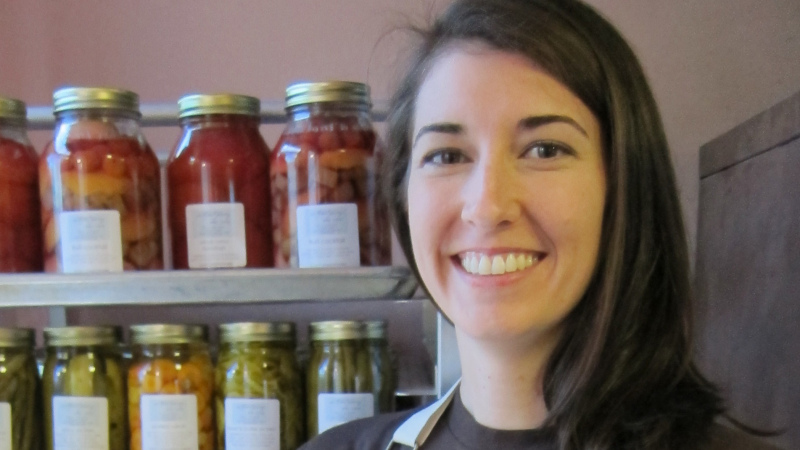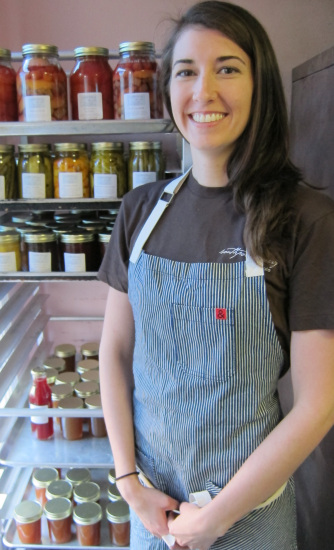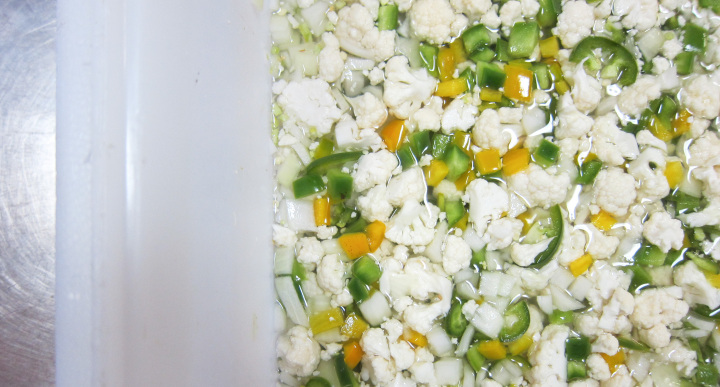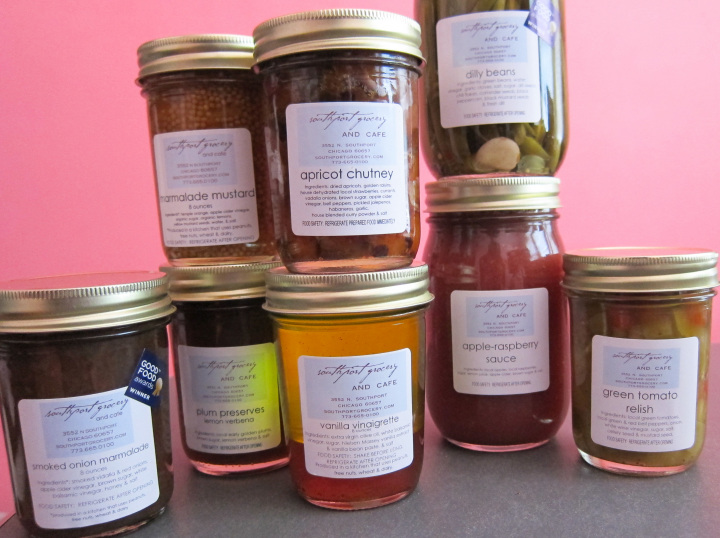
- October 7th, 2014
- 1 Comment
 A couple of years ago we got our preservationist to answer a handful of questions, but now we wanted to check back in. See what, if anything, she had to add. To no one’s surprise, she had things to say.
A couple of years ago we got our preservationist to answer a handful of questions, but now we wanted to check back in. See what, if anything, she had to add. To no one’s surprise, she had things to say.
What sort of things have you learned here, over the last 3 years, heading up canning? Has working closely with the farmers taught you anything?
Geez, lots of stuff.
For starters, weather conditions – brutal winters, early springs, and rainy, dry, cold or hot summers – obviously have huge impacts on crops. Some years there isn’t a type of fruit or vegetable we want available and other years there is a bumper crop. There can also be huge swings in how the fruit will act with the same recipe year-to-year. Because I use the same farm (Mick Klug Farm) every year and I’ve begun to understand how their fruit reacts to the methods I use. Every year serves as a guide for the next, but each year it’s still a learning experience. Mostly due to climate and weather changes. For example: in years past, I made a blackberry butter and it set up perfectly. This year we got huge, delicious blackberries, which probably had too much water from all the rain and, since I don’t add extra pectin, the blackberry butter just wouldn’t set up. So I was left with loose syrup. I worried over it for a week and then decided we were just going to use it in our sodas instead. Cucumbers are the same; how much water they get, how crowded they are in the field, and how much heat vs cool weather, all matter and all change the quality of the crop.
Another is figuring out who we can work with and when. When should we buy; which variety is best for which application and which crop can provide enough quality at the quantity we need? When is it worthwhile for the farmers to sell? When is it worthwhile for us to buy? Figuring out our production schedule against the growing season is tricky, since I need to fit in fruit and vegetables all around the same time, and that takes time to understand. Working with some farmers, we try to let them know what and how much we’ll likely need as we go through the season. And in turn, they let us know how their crops are coming along; it helps us decide what we make, as well as who we work with. Farmers that are receptive to our goals and communicate their needs are the farmers with which I like to maintain relationships.
Do you find most of your inspiration at the market?
The first summer (2011), yes. That year was about discovering and making and we tried a whole bunch of new things. Over the last couple of years I’ve been working on improving and perfecting what I make – focusing on the really successfully made and well received items. For example the pepper jelly, evolving from a box brand pectin based jelly into working with tart summer apples and in season sweet and hot peppers. Which makes for a really tasty, great textured, seasonal pepper jelly. It is still all the things it ever was, but now is so much better!
We try and work with our customer’s preferences & favorites. Using this knowledge, I talk to farmers and Local Foods – a locally grown produce distributor – to make produce choices for the best possible products.

Continuing education? What have you been working on?
I was trained and certified 3 years ago through University of Wisconsin for Acidified Food for Licensed Food Processor and this fall I’m going to take an online Food Preservation class through Michigan State University. It’s important to me to stay current on the science of food preservation, but reading and researching about current food trends is also an important element of what I do. Continuing education and experience teaches me how to do things more effectively; what we need to do or have to do to make it work well for us and the canned goods.
This past year I’ve also been studying and volunteering to become a University of Illinois certified Master Gardener, which is entirely for personal insight and community involvement. However, it has also given us a leg up on our little roof garden’s success. We’ve been using the tomatoes, peppers and herbs throughout the canning season and now dehydrating anything that is left.
I also like to eat at different places, read lots of books, and generally get inspired by my peers. For instance, I recently had a salad with a cherry tomato anchovy dressing. We wouldn’t do something exactly like it, but I can bring elements of the idea into what I do for the store. There is information everywhere! Since condiments are universal, I like to get insights from different cultures, sift through publications to build upon ideas we are discussing. Always finding processes, techniques, and ratios to make for a better canned good.
In addition to trying to improve upon what I already make or ideas for new items, this kind of constant research, education, and experience allow me to proactively look at items that others might view as “waste”, and make useful, tasty items.
Do you have a favorite machine? Something you couldn’t live without?
Robot Coupe, a really sharp mandolin and paring knife.
Using a Robot Coupe changed how much smoked onion marmalade I was able to make in a day (week, month, year!). It makes for a consistently fast prep every time, since the smoking and cooking then take many additional hours. However, I’m a firm believer that the best way isn’t always the easiest way. For the cucumber and green tomato pickles, for instance, it’s extremely important that there is consistent uniformity. In these cases, I use my wide body Japanese mandolin.
Also, I’ve gone through four brands of cherry pitters. It’s probably easy to understand that not all pitters are created equal. I have my favorite and a few runners up.
What process do you find most interesting?
R&D; Developing recipes. Because we have lab testing and the appropriate in-house equipment, I’m able to utilize the USDA approved processes in combination with my kitchen experience, Ball jar ratios, and “new” preservation ideas. Figuring out the best method for appearance, flavor and texture, playing with different flavor combinations, spices, sweeteners, vinegars, and fresh vs dried herbs and spices, adding spices to the brine or to the jar, do I or don’t I add sugar in the vinegar brine, cold water vs hot water brine, do I hot or raw pack an ingredient, when do I apply heat and when do I add sugar, etc. It takes a lot of testing – doing small changes to recipes. The Smoked Onion Marmalade went through four process changes and two recipe changes.
Also finding eco-friendly, US or locally produced items. I’m always hunting for environmentally conscience items for the preserves, not just produce, but vinegar, sweeteners, and spices.

Is there anything that has surprised you? Like in the way of ingredients, flavor changes.
Little things still surprise me every year. But specifically, with my first few batches of kimchi I was surprised by how much chili peppers mellow when fermented. And what a huge difference fresh over dried turmeric makes in our pickles and mustards.
What canned good are you most excited about? Which do you feel most creative pull to?
Anything that is a byproduct or creative use of what otherwise would be waste. Such as dehydrating the strawberries used in making the soda syrup to put in the apricot chutney, I used blackberry seeds to infuse vinegar which the kitchen used in a vinaigrette, roasting cherry pits and infusing simple syrup for soda, etc.
Using small ideas as a jumping off point; such as our trip to Co-Op (talking about vinegars) or working with other employee’s experiences and expertise in crafting new and interesting ideas (beer brewing methods in soda making). The evolution of making something better, as well as using the people around the grocery to create something new or better.
As far as most excited about, I’d imagine, it’s like choosing a favorite child. In the spring I’m excited for strawberries. During the summer, it’s all the pickles. Right now, I’m excited about apple butter. During the winter, it’s focusing on tasting and refinement. I really like that I can constantly work at coming up with a better and more effective way of doing the whole process. Each piece can be improved upon every time and I, we, are always trying to do that. We choose to look at what we’re doing well and making it better, over simply making crazy new items every year that we think are exciting. Although there definitely is some of that…
